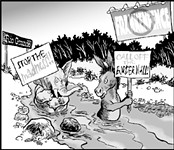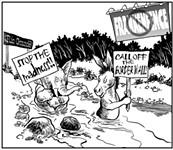Affordable Housing in NOLA
New report on housing conditions in post-Katrina New Orleans offers immediate and long-term recommendations for fixing the city's decimated fair and affordable housing market
By Cheryl Smith, Fri., Sept. 1, 2006
One of the report's short-term recommendations is that the four public housing complexes damaged by Katrina – about 4,500 units altogether – that the Department of Housing and Urban Development plans on destroying and replacing with mixed-income developments should be repaired and opened back up. "There need to be long-term solutions," said NAACP President Bruce Gordon during a telephone news briefing Monday. "The dilemma we have is that there's such a severe shortage of public housing today."
Former and current public-housing residents helped the organizations come up with the recommendations, said Tracie Washington, director of the NAACP's Gulf Coast Advocacy Center, during the briefing. It's not that people don't want mixed-income housing, Washington said. It's that people need places to live for the short term and that evacuees have to be able to get back to New Orleans and have a place to reside in order to be a part of the long-term rebuilding process. "It's clear that there is opportunity for an organized effort involving federal, state, and local [entities]," said Gordon, who defined "short term" as the next six months. Here are some of the report's short- and long-term recommendations.
Immediate Recommendations:
1) Shift all temporary rental assistance programs to HUD's Disaster Voucher Program.
2) Authorize additional housing vouchers to ensure that a portion of rebuilt private housing is affordable to low-income households.
3) Assist low-income homeowners in their efforts to repair or replace damaged homes.
4) Preserve existing federal housing resources in the Gulf Coast.
5) Require that HUD make its plan for New Orleans public housing available for public input.
Longer-Term Recommendations:
1) Require a Housing Opportunity Impact Statement as a condition of public support for future rebuilding efforts.
2) Fully fund the repair and rehabilitation of privately owned housing stock, for both short- and long-term housing needs, and for new construction for long-term needs.
3) Adequately support and enable HUD's Flexible Subsidy Program to provide no- and low-interest loans to damaged HUD project-based housing stock.
4) Fully fund 13,500 new project-based vouchers, tied to the production of new rental units developed through new Gulf Opportunity Zone (GoZone) Low Income Housing Tax Credits.
5) Promote home ownership among low-income families through down-payment-assistance programs and rent-to-own programs.
For the full report, see www.opportunityagenda.org.
Got something to say on the subject? Send a letter to the editor.












